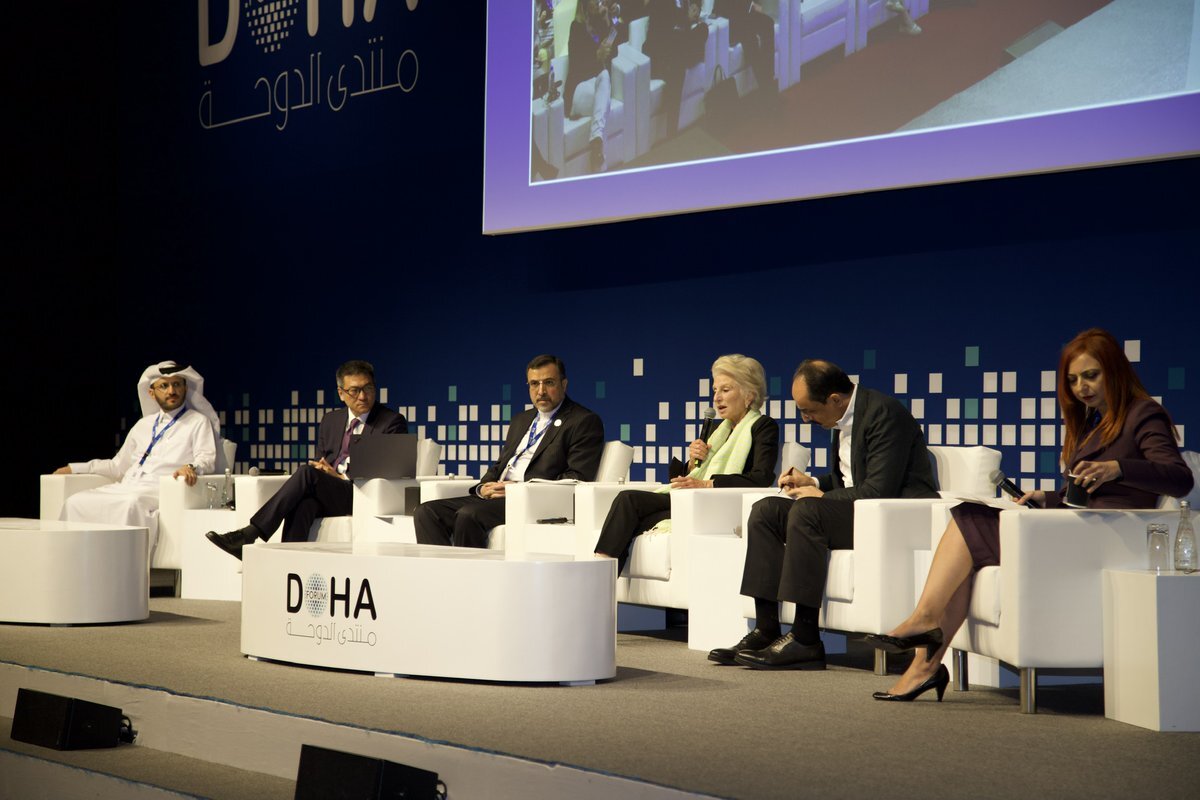Addressing a Gulf nation for the first time since the Russian invasion, Ukrainian President asks Qatar to boost its energy output to deter Moscow’s “threat.”
The spokesman for Qatar’s Ministry of Foreign Affairs, Dr Majid Al-Ansari, said that the country’s stance with regards to the Ukrainian crisis is “against this military escalation.”
In a panel at the 20th edition of Doha Forum and the ongoing full-scale Russian invasion of Ukraine being high on the forum’s agenda, he noted “we believe in dialogue and the importance that both parties get into dialogue as soon as possible. And we are willing to help facilitate that dialogue in any way possible. And this is why our foreign minister toured Europe and went to Turkey, and talked to the UK.”
Former Iranian FM: the US has to remove the IRGC from terror list
Having struggled “when it comes to the protection of its own sovereignty and making sure that whether it is a small, middle, or a large power,” Qatar ensures that it believes everyone should be treated equally.
As a small state, he added, it is within the country’s national interest to ensure that such conflicts do not persist and go beyond their immediate situation.
“Because smaller and middle powers are always the victims of any, you know, polarized international scene.”
In a surprise appearance at Doha Forum international conference 2022 on 26th of March, Ukraine’s President, Volodymyr Zelenskyy, called on Qatar, a world leader in liquified natural gas producer and exporter, to aid in increasing its energy output to “counter what he called the Russian threat to use energy as a weapon.”
Zelenskyy urged all energy-producing nations to take it on the role of preventing Moscow from “blackmailing” other countries and using its oil and gas export as an ultimatum.
Speaking directly to a Gulf country for the first time since Russia invaded Ukraine on February 24, he said, “I ask you to increase the output of energy to ensure that everyone in Russia understands that no country can use energy as a weapon and blackmail the world.”
The Ukrainian president argued that oil and gas rich countries such as Qatar could have a major impact on the stabilisation of Europe, “which imports more than one-third of its energy supplies from Russia,” Al-Jazeera reported.
Suggesting to reset the momentum in the current geopolitics, former United States Representative and US Congresswoman, Jane Harman said that the first topic to address on the agenda should be ways to cease the aggression in Ukraine.
“Next,” she added, is to gather countries to hold talks, in an event where regional issues, she argues, would “be resolved, including Israel, including a new state of Palestine.”
However with the precedence set by other US diplomats, a “new” state of Palestine suggests the unilateral and unjust claim to the land that is within the rights of the Palestinian people.
Referring to the Russian invasion of Ukraine, Spokesperson and Senior Advisor to the President of the Republic of Turkey, Ibrahim Kalin noted that “the power disequilibrium that has shaped the international order, ever since the end of the Cold War action over the last three decades, has everything to do with the rise of this crisis. And unfortunately, the eventual war that we are all trying to stop right now.”
Suggesting a new security architecture to the emerging geopolitics, Kalin said that key players need to join efforts to de-escalate the situation in Ukraine. Among impetus to host dialogues, he argued, Russia’s case on Ukraine should be “understood but not justified.”
Erdogan advisor Ibrahim Kalin tells #DohaForum that Russia's case (on Ukraine) must be understood, but not justified, and when the war is over and a new global security architecture is built, who is going to be able to talk to Russia if we have all burnt our bridges to Moscow?
— Trita Parsi (@tparsi) March 27, 2022
Iran’s Deputy Foreign Minister, Mohammad Hassan Sheikholeslami noted that Iran’s belief regarding the crisis holds that it has a “negative effect on the security structure in our region.”
Iran’s stance is one of “considering the historical cultural political differences between Iran and neighbouring countries and considering the Ukrainian we believe that we have to be even more active in our endeavours in order to come to a security arrangement in the Persian Gulf,” he added.
Follow Doha News on Twitter, Instagram, Facebook and Youtube







